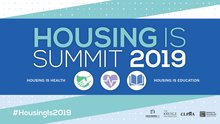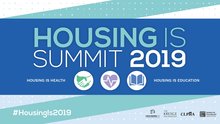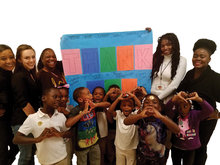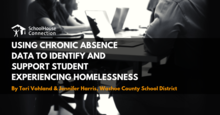Found 38 resources.
0
0
0
Looking largely at the 2020-2021 school year, the report is chock-full of information about how schools apply research-based strategies in a variety of different contexts – from very different school systems across multiple states – to make research translate into positive experiences and outcomes for students and their teachers in three critical areas:
• Instructional work, where math or English-language-arts teams, including instructional coaches, special-education teachers, and English learner/multilingual teachers, work to improve the quality of instruction within classrooms.
• Early...
Topics: Advocacy, Attendance, Child welfare, CLPHA, Community development, Education, Grade-level proficiency, Housing, Literacy, Low-income, Partnerships, Place-based, Supportive housing, Sustainability, Youth
 Shared by Karina George
on Jun 29, 2022
Shared by Karina George
on Jun 29, 2022 0
0
0
One Summer Chicago Plus is a jobs program designed to reduce violence and prepare youth living in some of the city’s highest-violence neighborhoods for the labor market. This study was carried out over the summer of 2013 in partnership with the Chicago Department of Family and Support Services. It found that the program, which provided a six-week, minimum-wage job for 25 hours a week, reduced the number of violent-crime arrests for participants by 33 percent over the subsequent year. The One Summer Chicago Plus 2013 study—accompanied by a long-term follow-up of the 2012 program—closely...
Topics: Child welfare, Community development, Criminal justice, Out-of-school time, Partnerships, Preventative care, Safety, Youth
 Shared by Housing Is
on Oct 15, 2020
Shared by Housing Is
on Oct 15, 2020 0
0
0
How Housing Programs Can Support the Educational Needs of Children Living in Publicly Supported Homes
Topics: Attendance, Broadband, Child welfare, Early childhood, Health, Housing, Literacy, Low-income, Out-of-school time, Partnerships, Place-based, Research, School-readiness
 Shared by Kelly McElwain
on Nov 7, 2019
Shared by Kelly McElwain
on Nov 7, 2019 0
0
0
It’s a prescription guaranteed to develop healthy brains, refine motor skills and prepare kids for school, doctors say. But few parents expect a physician to hand their children a book at their first wellness checkup at Nationwide Children’s Hospital in Columbus.
Topics: Child welfare, Early childhood, Education, Health, Literacy, Low-income, Partnerships
 Shared by Housing Is
on May 30, 2019
Shared by Housing Is
on May 30, 2019 0
0
0

A landmark National Academies of Sciences report commissioned by Congress concludes that childhood poverty in the U.S. could be cut in half within a decade with appropriate action. The report culls through the existing evidence-base to identify the most impactful existing policies including the Earned Income Tax Credit (EITC) and housing assistance. This panel will also discuss promising new policies that if enacted could help reduce poverty such as the child allowance.
Topics: Child welfare, CLPHA, Housing, Legislation & Policy, Low-income, Partnerships, Research
 Shared by Housing Is
on May 24, 2019
Shared by Housing Is
on May 24, 2019 0
0
0

Congresswoman Barbara Lee, long-serving progressive leader and member of the Budget and Appropriations Committee, and Co-Chair of the Democratic Policy and Steering Committee, will give remarks on congressional efforts to reduce child poverty.
Topics: Child welfare, CLPHA, Legislation & Policy, Low-income, Partnerships
 Shared by Housing Is
on May 24, 2019
Shared by Housing Is
on May 24, 2019 0
0
0
This report highlights the development and implementation of a mentoring program for college students in foster care in New York City through a strategic partnership that was forged among New York City’s Administration for Children’s Services, Goldman Sachs and Casey Family Programs. The program is designed to expose youth to professional and experiential opportunities through a series of one-on-one meetings and group workshops. Students have the opportunity to become familiar with the Goldman Sachs corporate environment, understand various business sectors and explore the roles and...
Topics: Child welfare, Foster care, Partnerships, Research, Workforce development, Youth
 Shared by Housing Is
on May 21, 2019
Shared by Housing Is
on May 21, 2019 0
0
0
Moving Health Care Upstream (MHCU) is based on the belief that health systems can address persistent and costly health inequities by moving “upstream”—beyond the walls of hospitals and clinics and into the communities, collaborating with community-based organizations to address the root causes of disease. The various areas of work within MHCU share a common focus-supporting hospitals and community stakeholders in testing and spreading strategies to move upstream, and sharing “what works” to inform the field and accelerate the upstream movement in the field as a whole. Policy Learning Labs are...
Topics: Child welfare, Early childhood, Food insecurity, Green, Health, Housing, Legislation & Policy, Nutrition, Partnerships, Youth
 Shared by Housing Is
on May 1, 2019
Shared by Housing Is
on May 1, 2019 0
0
0

The nonprofit LIFT Orlando and AdventHealth have started construction on a “first of its kind” early learning center in the long-neglected West Lakes neighborhood south of Camping World Stadium, with an opening expected by August. The center will provide basic education as well as health and wellness programs, an on-site doctor or advanced nurse practitioner, mental health counseling and other services beyond the classroom. It can enroll up to 220 children from age 6 weeks to 5 years, with half of the openings reserved for kids from the West Lakes area, who will be accepted regardless of...
Topics: Child welfare, Early childhood, Education, Health, Low-income, Partnerships, Place-based
 Shared by Housing Is
on Apr 4, 2019
Shared by Housing Is
on Apr 4, 2019 0
0
0
The Keeping Families Together model turned the usual paradigm for prioritizing affordable housing on its head. Rather than targeting the most “stable” families, Keeping Families Together sought out families with the most complicated cases—those at greatest risk. Thanks to this approach, families once on the brink of crisis now have a permanent place to call home, as well as the services and support they need to stay together.
Topics: Child welfare, Family engagement, Homelessness, Housing, Low-income, Partnerships, Research, Supportive housing
 Shared by Housing Is
on Apr 4, 2019
Shared by Housing Is
on Apr 4, 2019 0
0
0
This brief presents a new approach to support the development of early math skills in young children. The approach synthesizes the influence of parents, home environment, and children’s health care providers. The brief draws on research to explain (1) why it is important to support early math development, (2) what early math is (and isn’t), (3) how early math and literacy development intertwine, and (4) the important role parents play in their child’s development. The brief ends with a description of a promising approach to support early childhood math development that leverages communication...
Topics: Child welfare, Early childhood, Education, Health, Literacy, Partnerships
 Shared by Housing Is
on Mar 18, 2019
Shared by Housing Is
on Mar 18, 2019 0
0
0

When children get sick from poor living conditions inside their rundown apartments, they miss school. And when 95 percent of students of one school live in the same apartment complex—where evictions are routine and black mold is rampant—classrooms are often left empty.
Topics: Attendance, Child welfare, Education, Health, Housing, Low-income, Partnerships, Place-based, Youth
 Shared by Housing Is
on Mar 11, 2019
Shared by Housing Is
on Mar 11, 2019 0
0
0

Education Leads Home’s State Partnerships on Student Homelessness Project brings together policymakers and practitioners from with the goal of overcoming child and youth homelessness through education. Through the partnership, each state is committed to researching and implementing replicable best practices that address the most urgent needs of their unique homeless student populations. The State Partnerships on Student Homelessness Project is a nonpartisan effort to develop best practices that can be replicated by communities and states nationwide. In its inaugural year of the project,...
Topics: Child welfare, Education, Funding, Homelessness, Housing, Low-income, Partnerships, Youth
 Shared by Housing Is
on Mar 5, 2019
Shared by Housing Is
on Mar 5, 2019 0
0
0
John King served in President Barack Obama’s cabinet as the 10th U.S. Secretary of Education. Secretary King is one of the most prominent voices on the connections between housing policy and education policy, particularly with respect to pervasive socioeconomic and racial segregation. We sat down with Secretary King in Los Angeles to discuss the state of modern-day school and housing segregation, why he prioritized integration while in office, promising practices on both the education and housing fronts, and why education advocates must also be housing advocates.
“As citizens, we need to...
Topics: Child welfare, Education, Homelessness, Housing, Legislation & Policy, Low-income, Partnerships, Youth
0
0
0
A Summary of Results from the MIHOPE and MIHOPE-STRONG Start Studies of Evidence-Based Home Visiting
A healthy birth and positive experiences in early childhood can promote health and development. One approach that has improved outcomes for children and their parents is home visiting, which provides individually tailored support, resources, and information to expectant parents and families with young children. This brief summarizes recently published reports from two national studies of evidence-based early childhood home visiting: the Mother and Infant Home Visiting Program Evaluation (MIHOPE) and MIHOPE-Strong Start.
Topics: Child welfare, Dual-generation, Early childhood, Home visiting, Metrics, Partnerships, Place-based, Preventative care, Research
0
0
0

In this post, we hope to inspire others working in PreK-12 educational settings to examine rates of chronic absenteeism among the students they serve. We define chronic absenteeism and share three graphic displays of chronic absence data from our school district, the Washoe County School District located in Reno, NV.
Topics: Attendance, Child welfare, Education, Homelessness, Housing, Partnerships, Youth
0
0
0
Quality affordable housing can be a “vaccine” which prevents long-term health problems and promotes healthy, productive lives. When a family’s housing situation is unaffordable and unstable, chances to lead a healthy life dwindle rapidly.
Topics: Child welfare, Health, Homelessness, Housing, Low-income, Partnerships, Seniors, Stability
0
0
0
Teachers know that children learn better and are more likely to graduate when they live in a stable, affordable home.
Topics: Child welfare, Early childhood, Education, Housing, Partnerships, Youth
0
0
0

Since federal public housing assistance was first created in 1939 amid the Great Depression, public housing advocates have struggled with how to move low-income families to higher-opportunity neighborhoods, typically defined as neighborhoods with less poverty (though experts argue there are other ways to measure opportunity, including quality of schools and access to public transportation, and KCHA uses a broader “opportunity index” to compare locations). The Moving to Opportunity program, a federal demonstration in the 1990s, documented outcomes of families moving to neighborhoods with lower...
Topics: Child welfare, CLPHA, Early childhood, Education, Mobility, MTW, Pacific Northwest, Partnerships
0
0
0
Housing and health systems need to work together. Public housing authorities (PHAs) are significant providers of housing to those in need, offering the health sector scale and expertise. Little was known about how PHAs worked with the health sector writ large. With a national survey, we found that PHAs across the country are engaged in a wide range of partnerships with different health organizations that address various target populations and health priorities. Barriers to housing-health collaboration, such as funding and staffing capacity, can be overcome with cross-system partnerships that...
Topics: Child welfare, Funding, Health, Housing, Low-income, Medicaid / Medicare, Partnerships, Preventative care, Research, Seniors, Smoke-free
 Shared by Housing Is
on Dec 19, 2018
Shared by Housing Is
on Dec 19, 2018 0
0
0
Webinar slide deck that provides a brief overview of FUP, building blocks of successful FUP voucher implementation, facilitated panel on increasing impact and enhancing FUP operations, and other opportunities and resources.
Topics: Child welfare, CLPHA, Foster care, Funding, Housing, Legislation & Policy, Low-income, Partnerships, Preventative care, Safety, Supportive housing, Youth
0
0
0
The Colorado Division of Youth Services is working to transform the family experience by taking a two-generation (2Gen) approach to the services it provides.
Topics: Child welfare, Dual-generation, Early childhood, Family engagement, Low-income, Partnerships, Stability
0
0
0
Watch this recording of our live session where Senior Content Manager, Kama Einhorn, talks about resources from Sesame Street's Traumatic Experiences topic page.
Topics: Child welfare, Low-income, Mental health, Partnerships
0
0
0
Resources for integrating resiliency, hope, and wellness in schools
Topics: Child welfare, Low-income, Partnerships, Place-based, Research, Safety
0
0
0
It’s no secret that survivors of domestic and sexual violence make up a large percentage of the families and individuals who seek help from the homeless/housing services system. No one expects homeless/housing programs to become an extension of the victim services system. But the intersection between homelessness and domestic and sexual violence requires both systems to do their work with that reality in mind.
Topics: Child welfare, Domestic violence, Homelessness, Housing, Legislation & Policy, Partnerships, Safety
